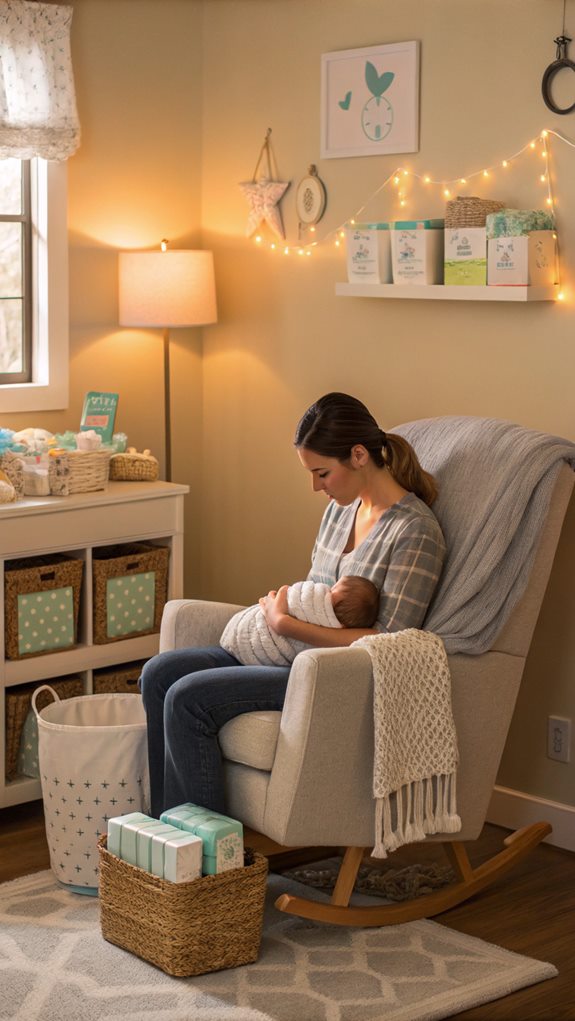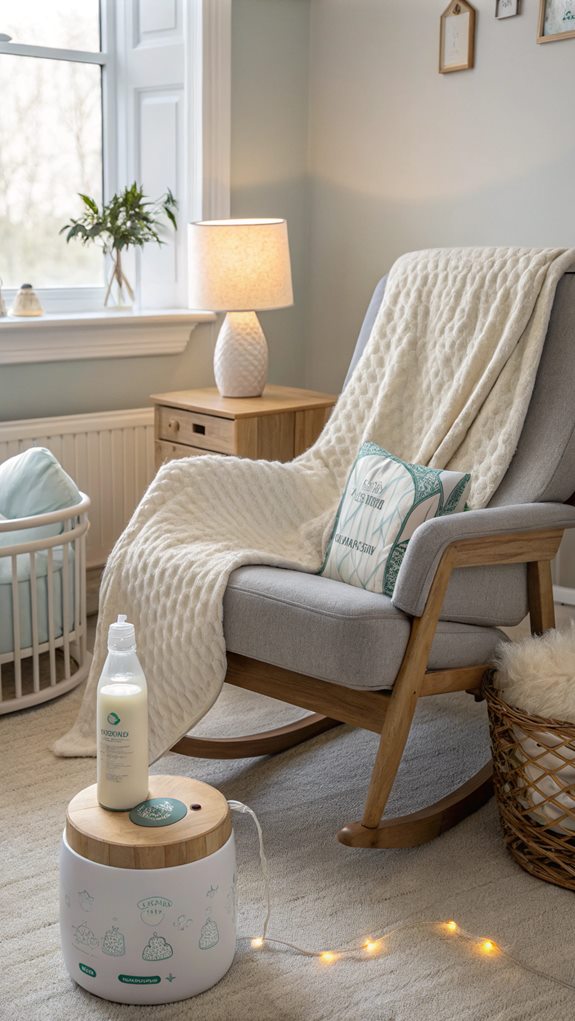So, you’re a new parent, huh? Welcome to the baby rodeo! Do support that tiny head while you’re holding them—no bobblehead babies here! Don’t forget to wash your hands like you’re prepping for a mad scientist project. Keep feeding them every few hours, but don’t freak out if they play hard to get with the nipple. When it’s bath time, stick to sponge baths until that umbilical stump says “adios.” Also, keep the room cozy—not an icebox or a sauna. And hey, if you want more golden nuggets of wisdom, stick around for the juicy details!
Key Takeaways
- Do support the baby’s head and neck while handling to ensure their safety and comfort.
- Don’t shake or make sudden movements with the baby to prevent injuries.
- Do prioritize self-care for parents to maintain health and effective caregiving.
- Don’t ignore hygiene practices; always wash hands before handling the newborn to prevent infections.
- Do observe and respond to baby’s cues for hunger, tiredness, and comfort needs to foster well-being.
Essential Support for New Parents

Becoming a new parent can feel overwhelming, but you don’t have to manage it alone. Seriously, seeking support from friends and family can make a world of difference. They’ve been through the newborn phase, so lean on their experiences and advice. It’s a wealth of understanding!
Don’t forget to establish boundaries with visitors. If you’re feeling overwhelmed, it’s totally okay to limit interactions. Your well-being should always come first.
And hey, consider hiring some professional help for those household tasks. You’ll want more bonding time with your little one, not stressing about the dishes!
Make self-care a priority, too. Find tiny moments throughout your day to recharge, whether it’s enjoying a hot cup of coffee or taking a quick shower. You’ll be a better parent for it!
Plus, joining parenting groups can be a game changer. Connect with fellow new parents, share your experiences, and gather resources to help you steer through these early days.
Safe Handling and Care
Caring for your newborn requires attention to detail and a gentle touch. You’re stepping into a world of tiny fingers and toes, and it’s vital to handle your little one with care.
Here are some key tips to guarantee safe handling:
- Support the head and neck: Always support your newborn’s head and neck. Their neck muscles are still figuring things out, so you’re the superhero here!
- Wash your hands: Before handling your baby, make sure your hands are clean. The first few weeks are essential for their immune system, and you don’t want to be the reason they catch a bug.
- Gentle movements only: Avoid shaking or sudden movements. Instead, rock your baby gently; think of it as a soothing dance that’ll make them feel safe.
- Monitor the umbilical cord stump: Keep that umbilical stump clean and dry. Give it some space to breathe and keep an eye out for any signs of infection.
It’ll fall off in no time, so hang in there!
Feeding Guidelines for Newborns

Once you’ve perfected safe handling and care, the next crucial aspect of newborn life is feeding. Feeding guidelines for newborns are pretty straightforward, but they’re essential for your little one’s rapid growth. Whether you’re nursing a breastfed baby or diving into formula feeding, you’ll want to make sure you’re meeting those newborn baby needs.
For breastfeeding, focus on a proper latch—trust me, it’ll save you a world of discomfort! If things get tricky, don’t hesitate to call a lactation consultant.
If you’re using formula, remember to discard room-temperature formula after two hours. No one wants a bacterial party in that bottle! Use refrigerated formula within 24 hours of opening; it’s safer and keeps your baby happy.
Plan for about eight to twelve feedings every 24 hours. That’s right! Your baby wants to eat every 1 to 3 hours, so get comfy!
After feeding, hold your baby upright for about 30 minutes. This helps with digestion and keeps the spit-up monsters at bay. Feeding your newborn can be a wild ride, but with a little practice, you’ll be a pro in no time!
Bathing and Hygiene Practices
Maintaining proper hygiene is essential for your newborn’s health and comfort. You want your little bundle of joy to feel clean and cozy, right?
Here’s what you need to keep in mind when it comes to bathing and hygiene practices:
- Sponge Baths Only: Give sponge baths until that umbilical cord stump falls off, usually in two to three weeks. This helps avoid infections.
- Gentle Soaps: Skip those harsh soaps and shampoos. Go for gentle, fragrance-free products to prevent skin irritation on your baby’s delicate skin.
- Daily Clean-Up: Clean your infant’s face, neck, and hands daily with lukewarm water to keep them fresh and remove any milk residue. Trust me, it’ll save you from some serious baby spit-up drama!
- Water Temperature Check: Always monitor the water temperature. Keep it warm but not hot—around 100°F (37.8°C) works perfectly to keep your baby comfy during baths.
Creating a Soothing Environment
Creating a soothing environment for your newborn is essential for their well-being and comfort. Think of it as setting up a cozy little retreat where your baby can chill out and feel safe. You want to create a calming atmosphere that helps them relax, so let’s explore some easy tips!
| Tip | Details |
|---|---|
| Dimly Lit | Keep the room soft and gentle on their little eyes. |
| Quiet Space | Choose a distraction-free zone for relaxation. |
| Comfortable Room Temperature | Aim for a cozy 68-72°F (20-22°C) – not too hot, not too cold! |
| Soft Music | Play some soft tunes or white noise to mimic womb sounds. |
| Neutral Colors | Use soft, neutral colors – loud colors can be visually overwhelming! |
Establishing Sleep Routines
Establishing a consistent sleep routine is essential for helping your newborn recognize when it’s time to sleep.
It’s like giving them a secret code to sweet dreams! Here are some tips to make newborn baby care a breeze:
1. Calming Bedtime Rituals: Start winding down with dim lights and soft music.
It’s like a cozy movie night, but for your baby!
2. Monitor the Baby’s Sleep: Keep an eye on those little snoozes.
Note their sleep patterns to see what works best for your family.
3. Encourage Self-Soothing Techniques: Gently rub their back or offer a pacifier.
Teach them to settle down like a pro instead of relying on you for every little sigh.
4. Flexibility in the Sleep Routine: Babies grow fast and their sleep needs change too.
Stay cool and adapt to their funky sleep patterns; you got this!
Recognizing Baby’s Cues

Recognizing your baby’s cues is essential for meeting their needs effectively. It’s like learning a secret language! When you notice them rooting or sucking on their fingers, it’s time for feeding—aim to do this within 1-3 hours of their last meal. Hungry babies can be very vocal about their needs!
Keep an eye out for signs of tiredness too, like yawning or rubbing their eyes. If they start getting fussy, it’s a good sign they’re ready for a nap.
And don’t forget about baby’s body language—if they’re arching their back or clenching their fists, they might need a diaper change or some comfort.
Also, watch how they engage with the world. If they gaze at you or turn their head toward sounds, they’re alert and might be ready for some fun playtime!
Keeping a journal of those baby cues and your responses can help you spot patterns. This way, you’ll be better at anticipating their needs and can respond effectively.
Managing Visitors and Help
While welcoming visitors can be exciting, it’s important to manage their presence thoughtfully during those early weeks with your newborn. You want to enjoy those snuggles without feeling overwhelmed.
Here’s how to tackle managing visitors like a pro:
- Set Clear Boundaries: Let friends and family know when you’re available. Prioritize bonding time with your little one over socializing.
- Schedule Visits: Plan visits in advance. This way, you can prepare mentally and physically, ensuring you have the energy to enjoy the company.
- Communicate Preferences: Don’t be shy about sharing health precautions. It’s totally cool to ask visitors to wash their hands or confirm their vaccinations. Your baby’s health is priority number one!
- Ask for Help: Encourage visitors to pitch in with household chores or meal preparation. Trust us, a lasagna or a clean floor can feel like a lifesaver when you’re juggling a newborn.
Prioritizing Parental Well-Being
Taking care of a newborn can be overwhelming, so don’t forget to prioritize your own well-being.
Seriously, self-care isn’t selfish; it’s essential! When you take care of yourself, you’re better equipped to care for your little one. Make sure your mental health stays strong by reaching out for support from friends and family. They can share their stories, and trust me, you’ll feel less alone.
Set boundaries with visitors; it’s okay to say no sometimes. Focus on bonding with your baby and managing your stress levels. You don’t need a full house when all you want is a cozy cuddle session.
Speaking of bonding, chat with your baby! Those little cooing conversations do wonders for emotional development and help you feel more connected.
Consider joining a local support group. You’ll find a community of fellow parents who totally get it. It’s a great way to share tips and build resilience together.
Share On X
Conclusion
Raising a newborn can feel like juggling flaming torches while riding a unicycle—exciting but a bit scary! Just remember to follow these do’s and don’ts, and you’ll be on the right track. Keep things safe, cozy, and fun, and don’t forget to take care of yourself too. You’ve got this! So, welcome the chaos, laugh a lot, and enjoy every snuggly moment. Before you know it, they’ll be off to college, and you’ll miss those tiny toes!
Join our list
Subscribe to our mailing list and get interesting stuff and updates to your email inbox.

